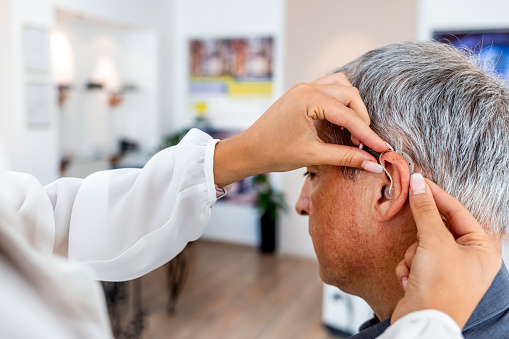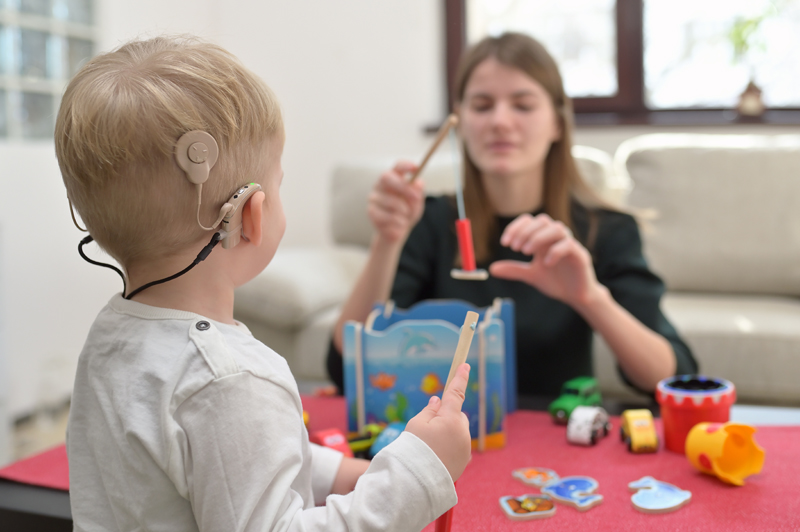The Psychology of Hearing Loss:
How Hearing Aids Can Help

Over 36 million seniors in America suffer from hearing loss. Hearing loss caused by aging is treatable, however, many seniors are unaware of their disability, and it takes someone close to them to point it out before they realize it, or they are not aware that their loss has become significant due to a slow decline rate.
If seniors refuse to seek treatment because they are embarrassed about admitting their hearing is failing, they may develop severe mental health issues that affect their psychological well-being. These issues may take time to develop, but the decline can be more rapid than is assumed by family and friends.
Encouraging your senior family member to have their hearing loss treated with hearing aids can help to improve their quality of life. A visit to HearCanada can help to diagnose their hearing loss and get them fitted with the proper device.
Keeping a close eye on those that you suspect may be suffering from hearing loss is essential. Many people with the beginnings of hearing loss are oblivious to the initial signs. Helping them to discover their options to improve their hearing can help to eliminate the possibility of cognitive decline, depression, and anxiety. Let's take a closer look at how hearing aids can help with the psychological effects of hearing loss.

Isolation
The affected senior may experience loneliness due to being removed from their social circle. When we are left to our own devices without emotional support, we tend to focus on ourselves, resulting in various mental health issues.Seniors living alone without assistance or a partner often suffer loneliness. Depression may develop as a result.
Social Relationships
Hearing loss may eventually lead to communication breakdowns. In addition to affecting your spouse, this disruption also affects your social circle. When people are speaking to a senior who suffers from hearing loss, they may ask them to repeat themselves repeatedly. The affected individual may withdraw from social life in an attempt to avoid conversation.
Anxiety
The mental health of seniors with hearing loss is weakened by anxiety and depression. Individuals suffering from social isolation and depression may experience panic attacks in trying to come to terms with their situation. For seniors with cardiovascular issues, panic attacks can cause severe health problems and can result in chronic issues.
Depression
Negative thinking can result from loneliness infiltrating the human psyche. Individuals who are affected may begin to feel abandoned. Thus, they isolate themselves from others and deal with suicidal thoughts.
Emotional disruption, such as depression, is a severe disruption of one's life, and experiencing negative emotions continuously is not a way to live. The onset of further mental health complications often follows depression in seniors because of the lack of support from others.
Cognitive Decline
As a result of hearing loss, dementia can progress if the brain does not receive enough stimulation. As a result of dementia, a severe form of mental illness, the normal functioning of the brain is disrupted. There are a number of symptoms associated with this condition, including memory loss and difficulty thinking clearly. In the absence of proper management, dementia may leave the patient with little to no resemblance to the person they once were.
Insomnia
Circadian rhythms or standard sleep patterns are affected by anxiety issues. When you are not asleep or awake, it is called insomnia. In the affected individual, REM sleep is impossible to achieve during the night. Due to insomnia, feelings of anxiety and depression are intensified, cognitive capacities are decreased, and emotional distress is exacerbated.
Malaise
When the mind does not understand what the body is doing, it suffers from this condition. It's a terrible condition for any senior to experience malaise, a feeling of dread and uncertainty. Upon receiving a diagnosis, the sense of malaise lifts. It's only when the brain realizes that there is hope for recovery that the malaise lifts.
How Hearing Aids Can Help
Those who have hearing loss can benefit from hearing aids. Most hearing aids have excellent user functionality and features, and are lightweight and comfortable to wear. Seniors who use hearing aids for the first time are often embarrassed. Despite this, after a few months, they wonder how they managed without it. Social isolation and psychological distress are relieved when seniors use hearing devices to remain socially active.
Seniors with untreated hearing loss can fall victim to any or all of the psychological issues we discussed. Consult your doctor about getting a hearing aid that dramatically improves your hearing ability and quality of life.